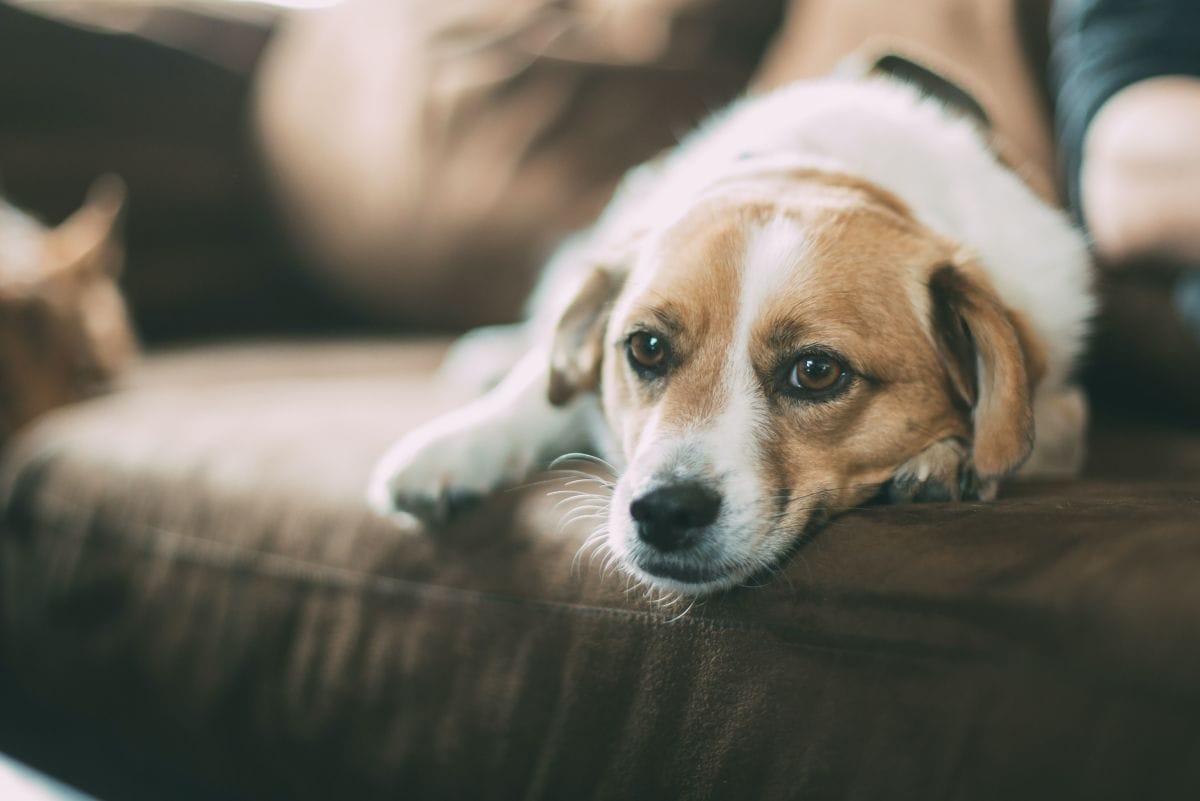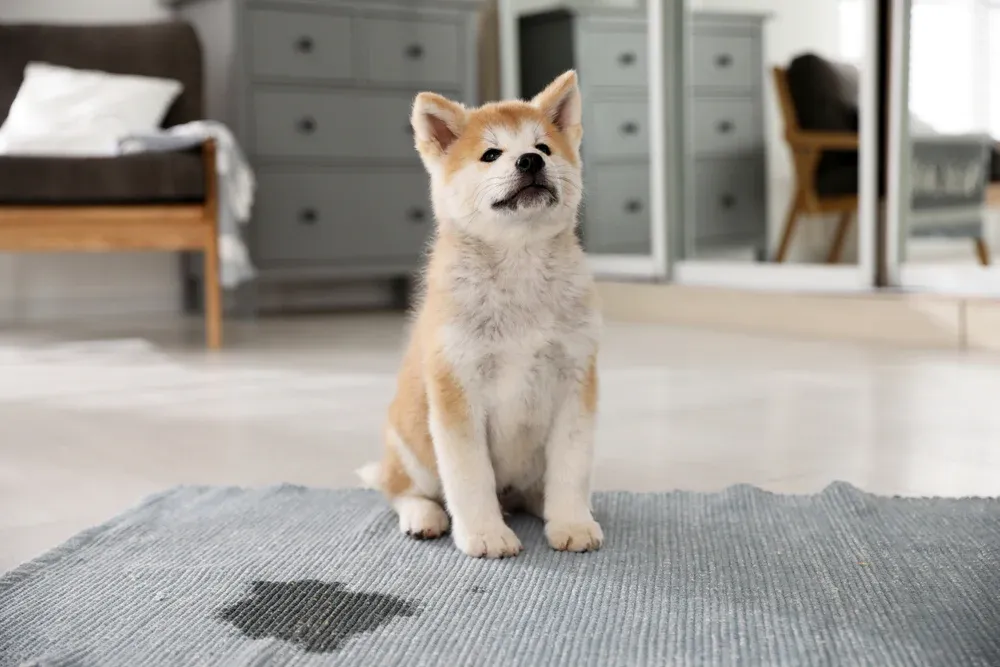Dogs are known for their loyalty, playfulness, and unconditional love. They are a popular choice for pets, as they bring joy and companionship to their owners. However, like any animal, dogs can have health issues that require attention. One of these issues is urinary incontinence, which can cause a dog to leak urine while lying down.

Urinary incontinence is a common problem in dogs, especially in older females. It occurs when the dog's bladder sphincter muscle weakens, causing urine to leak out. This can happen when the dog is sleeping, relaxing, or even just walking around. While it is not a life-threatening condition, it can be uncomfortable and embarrassing for the dog and its owner.
There are several possible causes of urinary incontinence in dogs, including hormonal imbalances, nerve damage, and bladder infections. It is important to take your dog to the veterinarian if you notice any signs of incontinence, such as wet spots on the bed or floor. With proper diagnosis and treatment, most dogs can manage their incontinence and continue to live happy, healthy lives.
Understanding Urinary Incontinence in Dogs
Urinary incontinence in dogs is a common condition that affects many dogs. It is a condition where the dog loses control of its bladder and leaks urine while lying down or sleeping. This condition can be caused by various factors, and it is important to understand the causes and signs of urinary incontinence in dogs.
Causes of Urinary Incontinence
Urinary incontinence in dogs can be caused by a variety of factors, including:
- Weak bladder muscles: This is the most common cause of urinary incontinence in dogs. Weak bladder muscles can be caused by aging, obesity, or hormonal imbalances.
- Urinary tract infections: Urinary tract infections can cause inflammation and irritation in the bladder, which can lead to urinary incontinence.
- Neurological disorders: Neurological disorders such as spinal cord injuries or brain tumors can affect the nerves that control the bladder, leading to urinary incontinence.
- Congenital abnormalities: Some dogs are born with congenital abnormalities that affect their bladder function, leading to urinary incontinence.

Signs and Symptoms
The signs and symptoms of urinary incontinence in dogs can vary depending on the underlying cause. Some common signs and symptoms include:
- Frequent urination: Dogs with urinary incontinence may need to urinate more frequently than usual.
- Urine leakage: Dogs with urinary incontinence may leak urine while lying down or sleeping.
- Urinary tract infections: Dogs with urinary incontinence may develop frequent urinary tract infections.
- Skin irritation: Dogs with urinary incontinence may develop skin irritation around their genital area due to the constant exposure to urine.
It is important to consult a veterinarian if your dog is showing any signs of urinary incontinence. The veterinarian can perform a physical exam and run tests to determine the underlying cause and recommend appropriate treatment.
Diagnosis of Urinary Issues
Veterinary Examination
When a dog is leaking urine while lying down, it is important to take them to a veterinarian for a thorough examination. The veterinarian will ask questions about the dog's medical history, including any previous urinary issues, and perform a physical examination. During the physical examination, the veterinarian will check for signs of infection, inflammation, or other abnormalities in the urinary tract.
Diagnostic Tests
In addition to the physical examination, the veterinarian may recommend diagnostic tests to help identify the cause of the urinary issues. These tests may include:
- Urinalysis: This test involves analyzing a urine sample to check for signs of infection, inflammation, or other abnormalities.
- Blood tests: Blood tests can help identify underlying medical conditions that may be contributing to the urinary issues.
- X-rays or ultrasound: These imaging tests can help identify any structural abnormalities in the urinary tract, such as bladder stones or tumors.
- Cystoscopy: This procedure involves inserting a small camera into the bladder to visualize the urinary tract and identify any abnormalities.
By performing a thorough examination and diagnostic tests, the veterinarian can determine the underlying cause of the dog's urinary issues and develop an appropriate treatment plan. It is important to seek veterinary care promptly to ensure the best possible outcome for the dog's health and well-being.
Treatment Options
Medications
There are several medications available that can help with dog urinary incontinence. These medications work by increasing the tone of the urethral sphincter, which helps to prevent urine leakage. Some of the most commonly prescribed medications include phenylpropanolamine, estrogen, and testosterone. It is important to note that these medications can have side effects and should only be used under the guidance of a veterinarian.

Surgical Interventions
In some cases, surgery may be necessary to treat urinary incontinence in dogs. One of the most common surgical procedures is the placement of a urethral sling. This involves placing a sling around the urethra to provide support and prevent urine leakage. Other surgical options include bladder suspension and colposuspension. It is important to discuss the risks and benefits of surgery with a veterinarian before making a decision.
Alternative Therapies
There are also alternative therapies that may help with urinary incontinence in dogs. These include acupuncture, herbal remedies, and physical therapy. While there is limited scientific evidence to support the effectiveness of these treatments, some pet owners have reported success with them. It is important to discuss these options with a veterinarian before trying them, as they may interact with other medications or have potential side effects.
Overall, the treatment options for dog urinary incontinence depend on the underlying cause of the condition and the severity of the symptoms. It is important to work closely with a veterinarian to determine the best course of action for your pet.
Management and Care
Home Care Strategies
When managing a dog that leaks urine while lying down, it is important to provide a comfortable and clean environment. Using waterproof bedding or puppy pads can help protect furniture and carpets. It is also important to clean the area where the dog has urinated immediately to prevent any odors or stains.
Pet owners can also consider using dog diapers or belly bands to help manage the leakage. These products are available in various sizes and styles to fit different breeds and can be easily purchased online or at pet stores.
Diet and Nutrition
Diet and nutrition can play a role in managing a dog's urinary incontinence. Feeding a high-quality diet that is formulated for urinary health can help prevent urinary tract infections and other related issues. It is also recommended to provide fresh water at all times to encourage frequent urination and help flush out the bladder.
Some pet owners may also consider adding supplements such as cranberry extract or probiotics to their dog's diet. However, it is important to consult with a veterinarian before adding any supplements to a dog's diet.

Exercise and Activity
Regular exercise and activity can also help manage urinary incontinence in dogs. Exercise can help strengthen the muscles that control the bladder and promote overall health. However, it is important to avoid high-impact activities that may put pressure on the bladder.
Pet owners should also encourage their dogs to urinate frequently, especially before and after activity. This can help prevent accidents and keep the bladder healthy.
Overall, managing a dog that leaks urine while lying down requires a combination of home care strategies, diet and nutrition, and exercise and activity. With proper management and care, pet owners can help their furry friends live happy and healthy lives.
Prevention and Early Detection
Preventing a dog from leaking urine while lying down is not always possible, but there are steps that can be taken to reduce the risk of this happening. Here are some tips:
- Keep your dog at a healthy weight: Obesity can put pressure on the bladder, which can lead to leakage.
- Provide frequent potty breaks: Dogs should be taken outside to urinate at least every 4-6 hours. If your dog is prone to leakage, more frequent breaks may be necessary.
- Encourage regular exercise: Exercise can help strengthen the muscles that control the bladder.
- Consider a dog bed with a waterproof liner: This can make cleanup easier if your dog does leak urine while lying down.
Early detection is important in managing urinary leakage in dogs. If you notice any of the following signs, it is important to schedule a visit with your veterinarian:
- Increased frequency of urination
- Straining to urinate
- Blood in the urine
- Urinating in inappropriate places
- Changes in behavior, such as increased anxiety or agitation
Your veterinarian can perform a physical exam and recommend diagnostic tests to determine the underlying cause of your dog's urinary leakage. Treatment options may include medication, dietary changes, or surgery, depending on the underlying cause.
When to Consult a Veterinarian
If a dog is leaking urine while lying down, it's important to know when to consult a veterinarian. While some cases of urinary incontinence may be due to a behavioral issue or a minor medical condition, others may indicate a more serious underlying problem.
Here are some signs that may indicate it's time to consult a veterinarian:
- The dog is leaking urine frequently or consistently, even when lying down.
- The dog is showing signs of discomfort or pain while urinating or leaking urine.
- The dog's urine has an unusual color, odor, or consistency.
- The dog is exhibiting other symptoms, such as lethargy, loss of appetite, or vomiting.
In some cases, a veterinarian may recommend diagnostic tests, such as blood work or urinalysis, to determine the underlying cause of the dog's urinary incontinence. Treatment options may include medication, surgery, or behavioral modification.
It's important to seek veterinary care as soon as possible if a dog is leaking urine while lying down, as untreated urinary incontinence can lead to complications such as urinary tract infections or bladder stones. With prompt diagnosis and treatment, many cases of urinary incontinence can be successfully managed, allowing the dog to live a happy and healthy life.
Conclusion
In conclusion, urinary incontinence in dogs is a manageable condition with the right approach and treatment. While it may be disconcerting for both pets and their owners, a combination of medical interventions, home care strategies, and lifestyle adjustments can significantly improve the quality of life for affected dogs.
Early detection and prompt veterinary care are crucial to effectively address this issue. By understanding the causes, signs, and available treatments, pet owners can ensure their furry companions remain comfortable and healthy. Always consult with a veterinarian to tailor a treatment plan that best suits your dog’s specific needs.




